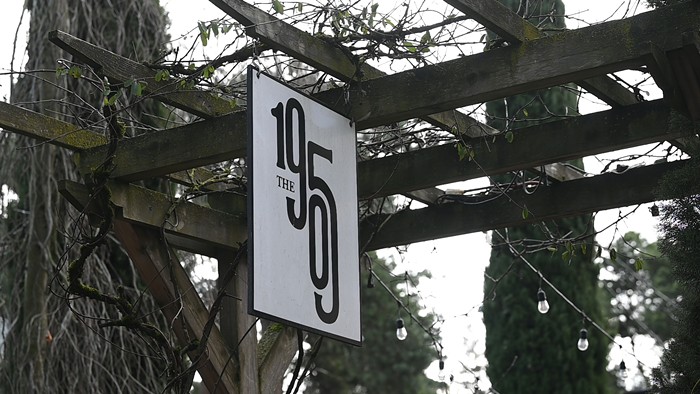The story of Flor sounds ready-made for a feature film: Four old friends start a rock band, realize they have a snappy sound, and decide to leave their small hometown to pursue their dreams in the nearest unforgiving metropolis. They find success, sign to a tastemaking record label (Fueled by Ramen), record a solid debut album, and tour all over the place.
In fiction, right here is where the band gets hoodwinked by a scummy manager type, and their interpersonal relationships become strained; fights over money, drugs, and/or fame ensue. Instead, here is where Flor strays from the typical script. Formed in Hood River, the savvy pop-rock quartet spent half a decade or so doing the LA thing, but before things could turn sour, they discovered who they are and what they do well, and half the band headed back north to live a life in Oregon that’s balanced and deeply rooted.
“I moved back to my family’s farm and renovated a cabin,” says McKinley Kitts, Flor’s guitarist. “I spend half the year in a one-bedroom cabin and half the year traveling the world on tour. It’s kind of a dream, actually.”
His bandmate, singer/guitarist Zach Grace, did approximately the same thing: “After being in LA, it’s good to get reconnected and feel like a part of something,” he says. “That’s what Hood River is for me. It’s like a deep sigh of relief.”
To be clear, neither Kitts nor Grace returned home as a retreat from Flor. The band is still striving for success, with a new album out called Ley Lines and a national headlining tour that brings them to Portland on October 8.
It’s just that success looks different than it did a few years ago, and the guys have a better understanding of how to get there. For example, in an industry riddled with co-writers and powerhouse producers, Flor made Ley Lines in bassist Dylan Bauld’s living room in North Hollywood with no help from anyone outside the band. (Bauld and drummer Kyle Hill still live in Southern California.)
“From the get-go, we’ve been a DIY band,” Grace says. “We’ve been at the forefront of the creativity. We produce it all. It’s actually hysterical: We moved to a city with some of the best producers and songwriters in the world and then we go and write the entire record as a band and record it in a house.”
It’s not the first time Flor has done that, either. They used the same approach for their 2017 debut Come Out, You’re Hiding. But Ley Lines is an entirely different animal from its predecessor, with sharper songs, fuller arrangements, and an energy that more accurately reflects Flor’s irresistible spirit as a live band. The songs still straddle the imaginary lines between earnest indie rock, twinkling emo, and dreamy pop music, but this time around they feel more intense, efficient, and, especially, more confident.
“The first record is pretty obviously someone slowly opening up and being vulnerable and gently placing their art out into the world and hoping that someone cares and maybe likes it,” Kitts says. “[On this second record], we’ve come to terms with the fact that people are connecting with the music.”
The men of Flor come by their newfound confidence thanks not only to the positive feedback they’ve received over the past couple of years, but also their own sweat equity. Their success is not something that happened overnight, nor have they had anything handed to them. Flor so far has been powered by the four musicians in the band, their creativity, and a commitment to their craft and perfectionism in the studio. Add it all up—and mix in some added maturity—and you’ve got a band that knows who they are, what they’re doing, and how to do it.
“Things happening slowly made it feel legitimate and real for us,” says Kitts. “We’ve had time to become confident in our own abilities and comfortable with ourselves and what we can do on our own. Our music is entirely true to us because we’re the only people involved in it. We couldn’t be inauthentic if we tried because there’s no one else in the room.”
Looking back, the members of Flor know they were pursuing something when they left Hood River for Los Angeles years ago. Now, they’re content to draw from what they’ve always had.
“The rest of the world’s doing its thing, so we’re just going to do ours and we’re going to find our lane with it,” Grace says. “That’s the way we feel about it, you know? No use chasing anymore. We have what we are. Let’s make it the best we can.”
Grace pauses, and then delivers a line that would work well as the tagline on a movie poster.
“We went down to LA to find something,” he says, “and ended up finding ourselves.”



















